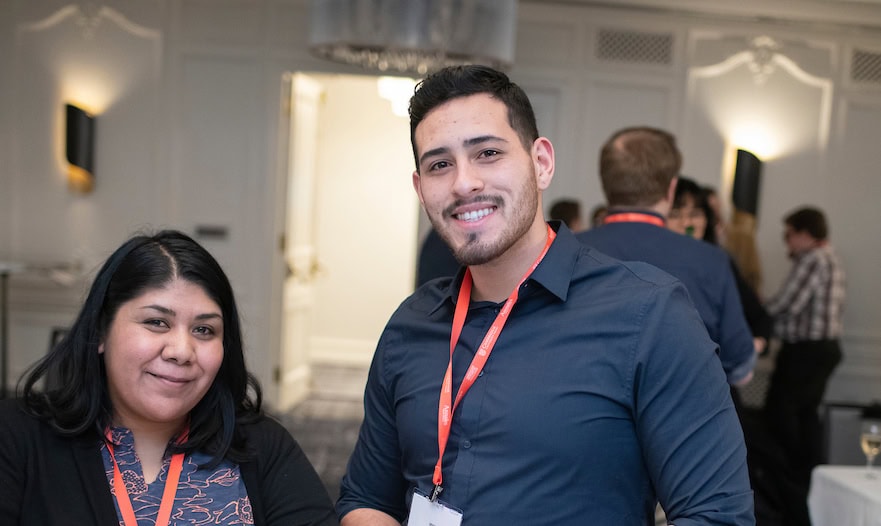AHA Partners with ACLS, MLA, SBL to Launch Doctoral Futures Initiative
The AHA, in partnership with the American Council of Learned Societies (ACLS), the Modern Language Association (MLA), and the Society of Biblical Literature (SBL), has launched Doctoral Futures. This three-year initiative (2025-28) aims to reimagine humanities PhD programs with new structures, policies, and academic cultures that will better prepare the next generation of knowledge producers. The program is made possible by a grant from The Mellon Foundation, with additional funding by the ACLS endowment.
Career Diversity for Historians
Supporting History PhD Programs
The AHA’s Career Diversity for Historians initiative (2011–22) began as an inquiry concerning career outcomes and evolved into a broad-based exploration of the culture, practice, process, and purpose of history PhD programs. Over the course of three grants from the Mellon Foundation, the AHA collaborated with 40 PhD-granting departments—a quarter of the history PhD programs in the United States—to better align doctoral education with changing professional opportunities within and beyond the academy and to better articulate the value of history and historical thinking.

Where Historians Work
Where Historians Work is an interactive, online database that catalogs the career outcomes of historians who earned PhDs at universities in the United States from 2004 to 2017.

Graduate Education Resources
This collection of resources is intended to help faculty and students integrate the ideas generated from the AHA’s Career Diversity for Historians initiative into graduate teaching and advising.

"What I Do"
History PhDs build careers in a stunning variety of professions. In these videos, history PhDs share what they do for a living, how they found their jobs, their transition from graduate school, and what it means to be a historian in their line of work.

Five Skills
The AHA worked with focus groups of historians with PhDs working in nonacademic careers to identify five skills that may not be honed in graduate school but that are necessary for success in a variety of career paths, including in academia.
Career Contacts
Since its launch in early 2015, Career Contacts has helped hundreds of historians explore potential career pathways. This popular program connects anyone with a graduate or undergraduate degree in history (junior contacts) with historians working outside the professoriate (senior contacts) for one-time informational interviews. Senior contacts work in a variety of fields and settings, including academic administration, nonprofit management, public policy, archives, museums, libraries, and K–12 classrooms, as well as the federal government and private industry.
The Origins of Career Diversity (2011)
In the fall of 2011, AHA president Anthony Grafton and executive director Jim Grossman published “No More Plan B: A Very Modest Proposal for Graduate Programs in History” in Perspectives on History and in the Chronicle of Higher Education. Grafton and Grossman challenged history PhD programs to reconsider their response to the longstanding pressures on the academic job market: it was time to change our definition of success, time to reconsider the career horizons of our PhD recipients. Rather than focusing exclusively on reproducing the professoriate, departments might encourage students to think expansively about career options and develop curricular and cultural programming to support that broader exploration of careers.
“No More Plan B” sketched a path forward for doctoral education that started by calling for a broader definition of “success” in PhD careers. In particular, this message struck a nerve with history PhDs working outside the professoriate, who contacted the AHA and asked how they could help. A small grant from the Andrew W. Mellon Foundation provided the funding necessary to transform Grossman and Grafton’s rhetorical call to action into a blueprint for the future of doctoral education in the discipline.
Graduate Education in Perspectives
Perspectives on History has published many articles over the years on the AHA’s Career Diversity for Historians initiative, graduate student life, career paths, and more.
The Research Phase (2012–13)
The AHA’s Career Diversity work began with a series of research questions. Gaining a firm sense of where historians were employed, why they chose their line of work, and how they drew upon historical skills and perspectives in their work was a necessary prelude to any large-scale initiative.
The Pilot Phase (2013–16)
In 2013, the Andrew W. Mellon Foundation awarded the AHA a second grant to examine how the insights of the exploratory phase could be integrated into the culture and practice of doctoral education. Four graduate programs received pilot funding from the AHA to create spaces for conversations about careers beyond the professoriate and identify structural opportunities to broaden career preparation. Over a three-year period, the Career Diversity pilot sites worked with the AHA to experiment with doctoral internship programs, revise professionalization seminars, create new models for courses and coursework, open new community spaces, sponsor regional conferences, create connections with other units on campus, and offer innovative grant funding to graduate students. Smaller grants awarded by the AHA to 10 additional history departments brought an even greater number of programming activities and a wider range of institutions into the mix.
The Implementation Phase (2016–22)
In December 2016, the Mellon Foundation awarded the AHA a third grant to continue its work on Career Diversity for Historians. This implementation phase dramatically expanded the reach of the initiative by providing funding for departments from across the country to create sustainable cultural and structural change in their doctoral programs.
The implementation phase began with a yearlong series of Faculty Institutes designed to prepare prospective participants to organize applications. In the spring of 2018, 20 departments in the Faculty Institute cohort were awarded Career Diversity Implementation Grants. These grants supported a Career Diversity team composed of faculty and a Career Diversity fellow, a PhD candidate who received funding to work in an administrative capacity.
The AHA's Role
The AHA is a leader in what is now a national conversation about career pathways for PhDs in all disciplines. Besides supporting our institutional partners, our role during the Career Diversity initiative was to create a space for discussions about history careers and the purpose of history PhD programs, and develop resources enabling students, graduates, and faculty affiliated with PhD-granting history departments across the country to explore history careers.

Partner Institutions
As part of the Career Diversity initiative, the AHA collaborated with 40 PhD-granting departments—a quarter of the history PhD programs in the United States.

Career Diversity Faculty Institutes
The AHA’s Career Diversity for Historians Faculty Institutes brought together working groups of faculty leaders to consider the purpose and future of doctoral education.
AHA Resource Library
Check out the AHA’s Resource Library for teaching and learning resources, AHA Online recordings, professional development, and much more.